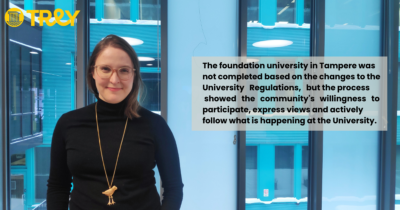It is not a self-evident fact that the university community may be involved in the preparation of decision-making at the University. Last autumn, it was great to see how a working group involving different groups from the university community was set up to look at the University’s management system and the need for changes to University Regulations. The group produced a report with 18 proposed amendments on the work at the University. You can read the report on University’s intranet. Based on the report of the working group, the University’s Board decided in December on the revised University Regulations, which entered into force on 1 January 2021.
In 2020, TREY declared that the foundation university in Tampere was not finished. The speech was related to the students’ demands for change in the University’s management system and University Regulations. Behind the demand was the idea of a university operating structure in which an active and interactive dialogue takes the university community forward. Students demand a thorough and open process in which every member of the university community can participate.
Community participation
The university community was able to comment on the report of the aforementioned working group. Individual people at the university, various groups, bodies, and representatives expressed their views through more than 200 comments on the report’s 18 proposals. The Student Union of Tampere University provided its own comments on the report and encouraged students and student associations to participate in the work. You can read TREY’s statement on the TREY website. Everything looked good and the work continued for the University’s Board, where in addition to the comments from the university community, the extracts of the report were legally assessed.
Based on the 18 proposals in the working group’s report, the University’s Board made only 4 changes to the University Regulations. Most of the proposals were discarded before the final decision. The changed items were as follows: In future, the Academic Board will elect its chair from among the professor members, the members of the Academic Board will be able to serve in preparatory groups set by the Academic Board for individual matters, the Provost acts as the meeting facilitator of the Academic Board and the Faculty Councils may have nine, twelve or fifteen members on the basis of a separate decision.
Centralised decision-making
For the university community, the Board’s decision was again an indication of centralised decision-making power. The university community or university bodies, such as the Academic Board and Faculty Councils, were unable to express their views on the University Regulations draft prepared for Board’s decision. Hearing would have been desirable because of the different relationships of dependencies and interactions within the University. The bodies are not completely independent. For example, the University Board decides on the University Regulations and the Regulations contain rules concerning the Academic Board. The hearing would have justifiably provided views for decision-making.

However, the changes show that the University has launched a dialogue on the organization, management system and Regulations of the University. Clarifications on the tasks and roles of the administrative bodies are important, even if they are only just starting the development measures. For example, other needs for change that were not mentioned in the working group’s report were missing from the process. For the future, I hope that all operators in the University will have a channel to take initiatives. The right of initiative would support active participation in common issues within the university community.
The foundation university in Tampere was not finished based on the changes to the University Regulations, but showed the community’s willingness to participate, express views and actively follow what is happening at the University. I would like to remind you that the central matter in universities as organisations is incompleteness. The tasks of universities are related to the search for new knowledge and educational aspirations. The constant desire to learn, to understand one’s own worldview and to reflect with other views are present in the daily lives of university people. I therefore expect the participation of the university community to be more strongly supported.